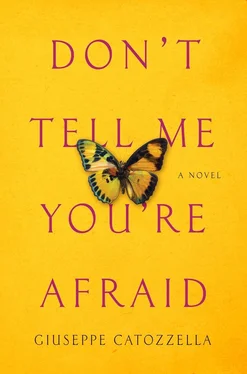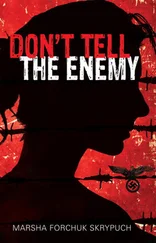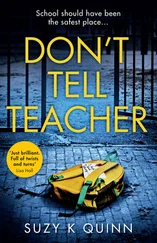“This Darod has a face just like a nigger,” they said.
Alì, as always, didn’t breathe a word; he looked them straight in the eye one by one.
“So this Darod doesn’t talk. He must be so hungry he even ate his tongue.” And the three morons burst out laughing.
Alì knew he wouldn’t get very far with three against one. Besides, he was in an Abgal district, so he didn’t have much hope. Remaining calm, he let the one who seemed like the leader get close enough, then suddenly, as swiftly as he had bitten the militiaman’s hand that long-ago night, he kicked him on the shin. The guy doubled over in pain and Alì ran away fast. The other two ran after him for a while; then, being slower than him, they blew the whistle that thugs wear around their necks for times like these. Tweeeeeee! So loud it could be heard through half the city. Turning the corner, Alì found himself face to face with a man who stopped him, demanding to know why he was running and whether he had by chance stolen something, which was contrary to the law of the Koran. Right then the two guys showed up and told the man that Alì was a thief, that he’d stolen their money.
They beat him and took everything he had, which was only that strapless wristwatch. From then on we did without a watch.
Now, with Said’s stopwatch, everything changed.
Who knew what Alì would have said. He’d have found it hard to believe that he could use a real timer. Being able to measure my times seemed impossible to me too.
Until that day all I had known was that I’d come in first.
I must have inherited the seed of madness from Aabe, in any case.
I was right to say that to Hooyo when she asked me. It was with my father’s permission, in fact, that I went to the CONS stadium at night on the last three days before the Hargeysa race.
I had been asking him for years. Alì had told me many times about how he and his friends Amir and Nurud would sneak in and play soccer there when they were little. It had stuck in my mind. A time when I could use the stadium in peace.
Aabe had never given me permission to do it. Until those three days before the race, when I went to plead with him, and he relented.
“Thank you, Aabe. I’ll be forever grateful to you,” I told him, making sheep’s eyes at him.
“I hope you’ll be grateful when these three days are over, because it will mean that nothing happened to you,” he replied worriedly.
The truth was that, even though it was pitch dark, this was the only time when there was no danger, because there was no one around and the evening curfew had already quieted things down.
I left the house around eleven o’clock, all covered up in my burka, and in half an hour, running through the most out-of-the-way streets, I was at the stadium.
I slipped through one of the holes in the fence, crossed the ticket-window area, climbed over a low gate that led to the central tunnel, and from there got in.
It was fantastic.
The scent of grass was overwhelming; my senses were completely engulfed by that sweet, subtle, pungent fragrance.
Having the empty stadium all to myself, illuminated only by the light of the moon, was as breathtaking as touching the star-studded sky.
I stopped at the edge of the tartan track on which I had won my first race and took off the onerous black burka. I folded it and left it on the ground. Then, as I took slow, deep breaths, just the idea of being in there at night produced a rush of adrenaline that energized me. I warmed up, taking long, unhurried strides that brought me to the center of the soccer field. From there, for a few seconds that lasted an eternity, I savored the sight of the deserted stadium.
Not a soul.
Only me, my breath, and the moon. And the scent of the grass, heady, all around me.
I pretended that there was peace outside, that this was a minor infraction and that I wasn’t risking anything.
It was there, on those nights, three days before the most important race of my life, that I discovered that I could run a hundred meters in 16.32 seconds and two hundred meters in 32.90 seconds. I had thought I was faster, but I wasn’t. Said’s stopwatch had revealed a bitter truth. My times were way over the world records; like it or not, I would have to improve. I had no choice but to improve.
On all three of those nights Aabe was there waiting for me at the exit to take me home safe and sound. On the way back, covered by the burka but skipping joyfully, I spelled out everything I had to do to improve. He kept looking around nervously, and every so often he would stop and threaten me with his cane, telling me to settle down and not attract attention, or he’d bop me on the head. I laughed; I knew we shouldn’t be out and about at that hour, but I was happy.
The sudden freedom, the empty stadium, the full moon, the scent of grass filled me with irrepressible euphoria.
Aabe got mad and told me to quiet down.
But all I could think about was the race.
Three days later I left for the north.

THE BUS TRIP TO HARGEYSA made me feel like a celebrity. I was by myself and the ticket was expensive, the equivalent of sixty U.S. dollars — being able to buy it was a miracle in itself.
I had never been on a bus. Everything was very comfortable, the seats soft and roomy, covered in gray velvet, and there was background music. The driver wore a dark blue uniform and he was very kind. When he saw me get on alone, wearing the tracksuit that Aabe had gotten hold of somewhere and given me for the occasion, he must have thought I was a famous athlete. He looked at me and greeted me the way you regard and address a person worthy of respect.
“Good morning, abaayo ,” he said to me as I climbed in. “Have a good trip.”
“Thank you” was all I managed to say, I was so excited.
The journey took almost a whole day.
I felt like one of those tiny birds that beat their wings so rapidly that all you see is a blur; the birds look like they’re suspended in the air, dangling somehow from an invisible thread. I was so impatient that I couldn’t sit still. I must have gotten up a hundred times with the excuse of stretching my legs. When we stopped to get out and eat something or go to the bathroom, I couldn’t wait to get moving again.
We reached our destination at seven the next morning, as the sun was rising. I hadn’t slept for even one minute.
I got off the bus with the strange feeling of being in a country at peace.
The fact that there were no armed guards at the station, that there were no traces of guns or camouflage uniforms, and that outside there were no bullet holes in the walls didn’t seem real. I felt disoriented. Like an animal that has spent its entire life in a cage and suddenly finds itself free, the cage door open. I was struck by a feeling of extreme euphoria, which instead of spurring me on at that moment immobilized me. I was tempted to turn around, get back on the bus, and return home to my natural setting, where freedom was measured by counting land mines and mortar rounds. That morning at dawn, with the sun peeking shyly through the cracks between the station’s wooden roof and walls, I thought that too much freedom so unexpectedly isn’t good for people; they aren’t used to it.
I sat on a metal bench beside a newspaper stand and waited a bit. The news vendor was opening up just then, his face still sleepy.
With the few shillings I had I bought a shaat in the only bar that was open. The heat flowed from my hands to my throat and from there, after a while, finally reached my head.
I made my way to the stadium on foot.
Читать дальше





![Ally Carter - [Gallagher Girls 01] I'd Tell You I Love You But Then I'd Have to Kill You](/books/262179/ally-carter-gallagher-girls-01-i-d-tell-you-i-lo-thumb.webp)







